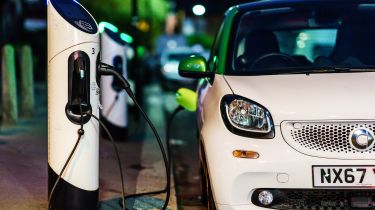Government invests another £20m in kerbside electric car chargers
Continuation of On-Street Residential Chargepoint Scheme could see number of on-street electric vehicle chargers in the UK double

The Government has announced it will continue to fund the installation of on-street electric vehicle charging points, with the allocation of £20 million for the 2021/22 financial year - twice as much as the £10 million for 2020/21.
The continuation of the Department for Transport’s On-Street Residential Chargepoint Scheme will give local councils the opportunity to install as many as 4,000 kerbside EV chargers, which would double the total number of on-street charging points in the UK.
The Department for Transport is accepting applications from both councils that have previously received funding and those that haven’t. The scheme is part of a wider plan to invest £1.3 billion in charging infrastructure over the next four years.
However, despite around 40 per cent of people in the UK having no access to off-street parking, there have been difficulties getting councils to take-up the funding. Research by Centrica (below) reveals that councils are planning to install just 35 on-street chargers each between now and 2025, while 126 local authorities have no plans to install any at all.
The same research also showed a significant disparity between regions, with local authorities in the south of England planning to install 2.5 times more on-street chargers than councils in Northern England, the Midlands, Scotland, Wales and Northern Ireland combined.
Grant Shapps, secretary of state for transport, said: “With a world-leading charging network, we’re making it easier for more people to switch to electric vehicles, creating healthier neighbourhoods and cleaning up our air as we build back greener.”
Edmund King, president of the AA, commented: “Good progress is being made, but in order to help current and future EV drivers, more charge points will need to be installed. For the 40 per cent of households without designated off-street parking, finding a viable, cheap and simple-to-use solution is key.
“However, our own study last year showed that some councils used this grant to only fund charge points in town centre car parks. While car park chargers are important, we feel this goes against the spirit of the grant, which is aimed at tackling the problem of EV drivers without off-street parking.
“The charging network must also be reliable, which is why we are working with charge point operators to help keep the power flowing.”
UK councils plan just 35 new chargers each
Local councils are currently planning to install 9,317 on-street public electric car chargers between now and 2025 - an average of just 35 per council - despite a ban on the sale of new conventional petrol and diesel cars from 2030.
There are a mere 7,682 public on-street chargers currently installed in the UK, leaving drivers with no access to off-street parking concerned about how they would charge an electric car at home.
126 councils out of over 400 that received a Freedom of Information request from Centrica have no plans to install any on-street EV chargers between now and 2025.
There’s also a significant disparity between regions, with local authorities in the south of England planning to install 2.5 times more on-street chargers than councils in Northern England, the Midlands, Scotland, Wales and Northern Ireland combined.
Westminster plans to install more on-street chargers per 100,000 residents by 2025 than any other council, followed by Kent and Stirling.
|
Top 10 councils | Chargers per 100,000 people to be installed by 2025 | Existing on street chargers |
| Westminster | 500.2 | 497 |
| Kent | 240.3 | 201 |
| Stirling | 156 | 56 |
| Plymouth | 122.1 | 33 |
| Haringey | 111.7 | N/A |
| York | 97.8 | 23 |
| Gwynedd | 80.3 | N/A |
| Richmond upon Thames | 70.7 | 227 |
| Hackney | 65.8 | 116 |
| Brent | 64 | 149 |
Centrica also polled 2,000 UK drivers, with 83 per cent saying it would be easier for drivers with access to off-street parking to switch to an electric car. Of those who said they would not consider purchasing an EV, 49 per cent blamed a lack of public charging points in their area.
77 and 76 per cent said that investment in on-street chargers in urban and rural areas respectively would help encourage more drivers to go electric.
Do you think the UK's electric car charging infrastructure is good enough? Let us know your thoughts below...
Find a car with the experts





